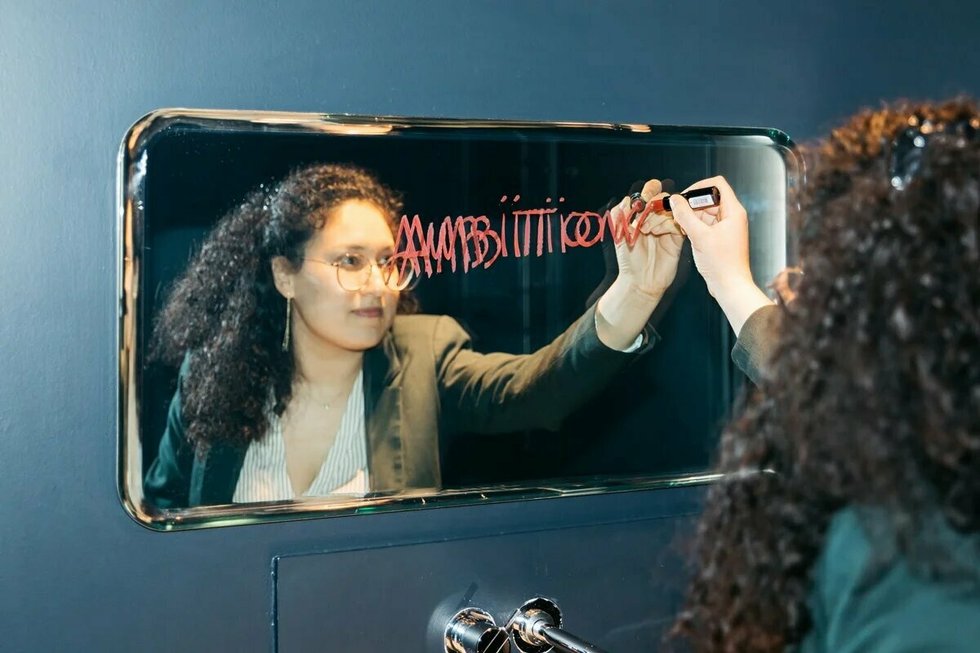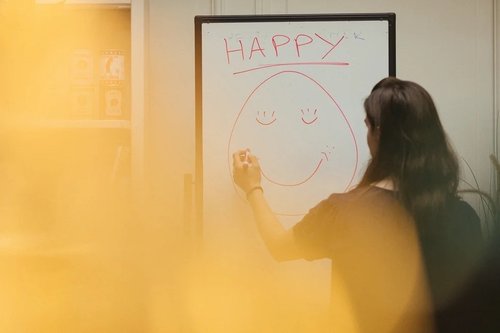The law of attraction: Does it really work?
Apr 05, 2022 - updated Apr 10, 2024
9 mins


Journaliste - Welcome to the Jungle
Every year, some new self-help technique comes into fashion. Then the manuals promising a happier and healthier life invade the shelves. On YouTube, wellness specialists’ channels are full of videos with catchy names like “Secrets to your miracle morning routine,” or “How to be more productive: The 5-second rule.” Today, it’s the law of attraction that’s made it to the top of my TikTok feed. Beautiful—and likely very wealthy—people share on camera how they’ve achieved success by focusing on positive thinking. Open to the idea of becoming rich and successful myself, I decided to try it out.
The law of attraction: the gist
Let’s start by taking a look at the concept, which straddles the line between the esoteric and self-help. The law of attraction was first mentioned in Isis Unveiled by the Russian philosopher Helena Blavatsky in the second half of the 19th century. She starts by mentioning the power of attraction in the universe: “There, if you try to embrace in the unity of a single law all these bodies and their movements, if you seek the word which explains, in this vast panorama of the universe, this prodigious harmony, where all seems to obey the empire of a single force, you pronounce a word to express it, and say Attraction!” This new-age way of thinking, in which positive energy attracts the positive, was further developed 10 years later by the journalist Prentice Mulford. It came into wider use in the 2006 bestseller The Secret by Rhonda Byrne, which was turned into a documentary that same year.
The law of attraction is not based on any scientific research. It states that by adopting a positive attitude, you attract positive things. To put it into practice, you must fill your daily routine with dozens of exercises that promote positive beliefs about yourself to encourage good karma. In fact, the law of attraction is a bit like the agile method of esotericism: a vague concept with lots of equally nebulous exercises. One of the most popular is to choose a positive mantra that you repeat to yourself throughout the day to get a feel for it. For example: “I am capable of saying no,” “I am comfortable in my professional relationships,” “I am capable of asking for that raise.” These are called positive affirmations.
“To put it into practice, you must fill your daily routine with dozens of exercises that promote positive beliefs about yourself to encourage good karma.”
That’s not all. If you want to make your desire a reality, you must also visualize success and the emotional state it would put you in. In short, if you want to be rich and go live in Dubai, just tell yourself that you can simply attract this by imagining yourself riding a quad bike in the desert, or eating a steak covered in gold. And above all else, think about just how much happiness it would bring you. Jokes aside, a more realistic example might be visualizing yourself living in your dream home: what does it look like, and how do you feel living there?
You can also add in some other exercises, such as showing gratitude, which is about thanking a person or the world for giving us something (a roof over our head, a beautiful sunset), meditating, or even using vision boards (like moodboards for our dreams).
It’s trendy
Before I test it out, there’s still one big question: how do you explain the success of the law of attraction? It’s not based on a scientific study, so why do so many people buy into it? For the psychologist, professor, and author Yves-Alexandre Thalmann, it can be explained by the possibility of individual action that the law of attraction brings: “It gives people some control. It convinces them of a gain in agency—it gives them the feeling of being a real player in the world.” The bonus: All this content that encourages you to embrace the law of attraction is marketed as a secret that will lead to certain happiness. They use the same methods as those ebooks that want to sell “a simple method, accessible to anyone, that requires no skills to become rich, all thanks to the internet.” You’re intrigued, you’re lured in, and you’re lucky enough to be in the know (even if that knowledge comes with a cost). And it’s not just any old secret—this one is going to change your life, and everyone else will be left behind. If you’re not yet convinced, the testimonials from people on social media “whose lives have been changed thanks to the law of attraction” will win you over, despite the lack of concrete results.
The pressure to be both personally and professionally successful might explain the growing interest in the theory right now. “The quest for success is obviously driven by social media,” said psychologist Sarah Bezençon. “But I think the draw of the law of attraction is also linked to a need to return to the spiritual in our lives. While religion has taken a backseat in our daily life, personal development and the self-help movement are gaining ground to provide us with new guidelines to live by.”
“I think the draw of the law of attraction is also linked to a need to return to the spiritual in our lives.”
The test
I’d love to say I tested the law of attraction for a full three weeks, but I quickly realized that some elements were already part of my life even before I began the experiment. And that’s likely true for most people. Who hasn’t already said to themselves, “You’ve got this, you’ve got this,” before a presentation or an exam? Or “Take advantage of this moment because it’s amazing,” to make the most of the now? Who hasn’t imagined themselves announcing fantastic news to their loved ones so they can show off? Personally, I like to imagine myself in my dream job or that I’m stuffing my face with ramen instead of a boring sandwich for lunch. I also love scripting future conversations while in the shower or bathroom. Clearly, all of us are already involved in these practices to a certain extent.
This time around, however, I took a more rigorous approach to the experiment, focusing specifically on positive affirmations. Although most of them from a list I found seemed kind of generic, others felt closer to what I was looking for: “I’m doing the best I can,” so as not to put too much pressure on myself on days when I’ve got a lot to do; “I admire that which surrounds me and I appreciate its beauty,” to better enjoy my weekends; “I’m going to attract new opportunities,” because it can’t hurt to try; and lastly “I am reliable and I always finish what I start.” So every day and all throughout the test period, I repeated these mantras to myself in front of my mirror. This is what I got out of it.
Affirmations that uphold our intentions
Let’s start with the positive, because yes, even if I was skeptical, there was some good that came out of this experiment. First, the idea of repeating a positive affirmation has the benefit of reminding you of your goals. Because even though you get up every morning determined to become a better person, the intention tends to wane throughout the day until it disappears altogether. Positive affirmations act as little reminders. When I feel like procrastinating, I remind myself that “I am reliable and I see things through to the end.” But there’s nothing inherently magical about that. “Affirmations can help support your intentions by reminding you to stay focused on your goals,” said Bezençon. “There’s a lot of work done on this technique in hypnosis sessions. By helping people access a broader level of consciousness, we can help them avoid self-sabotage.”
“Affirmations can help support your intentions by reminding you to stay focused on your goals.”
It’s important to qualify the end result. My life hasn’t changed radically, but the affirmations have helped me finish small tasks that have been on my to-do list for months, as well as make me feel better about my own skills.
Can it help identify your needs?
Another good thing about positive affirmations is that they give you the opportunity to explore your needs on a daily basis. To choose which affirmation to use throughout the day, or even over a period of time, ask yourself, “What resources will I need to draw on to face the world these next few days?” Do I need courage, patience, kindness, energy? Not only does it help to better anticipate your needs, but “it helps articulate your goals and make what you want clearer,” said Bezençon. “If you realize that you’ve chosen an affirmation that doesn’t sound right, it can lead you to adjust your goals.” Thalmann is more nuanced in questioning this benefit: “I’ve noticed that my patients know what they want to achieve in life without needing to use any specific method,” he said.
“Another good thing about positive affirmations is that they give you the opportunity to explore your needs on a daily basis.”
So what about the criticisms?
Denial and guilt
While testing the theory, there were days when repeating positive affirmations felt absurd. Why? Because it was too far removed from my perception of reality. I almost felt like making fun of myself for being a sucker who was trying to convince herself how amazing she was when she actually felt quite lame (everyone has those days). The positive affirmations made me feel worse in those moments because I was focusing on everything I had botched. Telling yourself that you’re reliable when you haven’t sent that email, or you’ve put off a deadline—that’s what I call being in denial.
“The positive affirmations made me feel worse in those moments because I was focusing on everything I had botched.”
That’s the inherent danger with the law of attraction. “Not everything in life depends on you,” said Thalmann. “I don’t think the war in Ukraine is the result of negative thoughts on the part of the Ukrainian people. However, you run the risk of holding yourself responsible for having had negative thoughts if bad things end up happening to you. With the law of attraction, you leave yourself open to feeling guilty about things.” For Thalmann, telling yourself repeatedly that you’re amazing is like totally messing up a dish you make for dinner with your friends, but they keep saying it was delicious. “It just rubs salt in the wound!” On the other hand, I’m surprised when I see some people thanking the law of attraction, rather than congratulating themselves, when they achieve success. If you’ve landed a promotion, a new job, or a big check, it’s mostly thanks to your hard work, right?
Overall, I quickly got bored with the positivity required by the law of attraction when facing a challenge. Negative emotions aren’t allowed because they might attract the negative, so you have to keep your dark side quiet. This was complicated for me as I’m one of those people who thinks that anger, frustration, jealousy, and sadness cannot, and should not, be ignored; that chaos, disgrace, and uncertainty will give you clues about what you feel and what you need. “As human beings, we deal with inner turmoil,” said Bezençon. “Sometimes we feel bad, and we have to take notice because there’s nothing productive in pretending to feel good. I would even say that it’s actually quite harmful not to acknowledge it.” For me, this is one of the biggest flaws in the law of attraction.
“Sometimes we feel bad, and we have to take notice because there’s nothing productive in pretending to feel good.”
The problem of taking action
Because the law of attraction exercises rely solely on the power of thought, they’re ultimately ineffective. After three weeks of testing this out, I’m convinced that it will take more than a few positive affirmations to make me care about something, or to stop procrastinating. It’s better to surround myself with people who make me feel better about myself, who help me get better organized, or who urge me to go to bed earlier. Words have to be followed by action.
The German academic and psychologist Gabriele Oettingen has shed some light on this problem with positive thinking. During a study, she asked one group to think of the objectives they wanted to achieve by precisely visualizing their success (the principle behind the law of attraction); she asked a second group to think of the obstacles that might prevent them from reaching their objectives; and finally, she asked a third group to visualize their success, but also their potential obstacles, as well as the means to overcome them. Guess which group achieved their goals? The third. And this was true no matter what the objective was: meeting a partner, a new professional opportunity, an exam… “It’s good to be self-confident, but in order to achieve your goals, you have to adapt your behavior and stop with the magical thinking,” said Thalmann. “Affirmations aren’t enough if you’re not setting a dynamic in motion. You have to give in to the reality of it,” said Bezençon.
“Affirmations aren’t enough if you’re not setting a dynamic in motion. You have to give in to the reality of it.”
Psychology first and foremost
You’ve probably figured it out by now—the conclusions are mixed. According to Thalmann, “The law of attraction is fake news. There is no debate. The concept is based on something that scientific psychology has never proven. It’s simply self-help.” Ultimately, in order to grow and be in harmony with yourself, wouldn’t it be better to focus on psychology rather than self-help?
For Bezençon, the law of attraction is still compatible with psychology: “You can pull a few interesting elements out of the law of attraction, especially showing gratitude, which is highly recommended within positive psychology. Overall, I think this desire for self-confidence and resilience should be encouraged. It is also good to be able to imagine yourself in your dream scenarios. But you have to avoid feeling guilty because that can become a trap.” So it’s better to stay away from the miracle recipes for happiness and to start looking inside yourself instead. And for this introspection to be meaningful, Thalmann thinks you should be doing the work with the help of a mental-health professional.
As for me, I’m done with the law of attraction. I’m neither happier nor unhappier than before—the whole thing just feels pretty useless to me. Hundreds of books, and endless YouTube videos and articles to learn that in the end you need to believe in yourself? It’s hardly reinventing the wheel.
Photo: Welcome to the Jungle
Translated by Kalin Linsberg
Follow Welcome to the Jungle on Facebook on LinkedIn and on Instagram and subscribe to our newsletter to get our latest articles every day!

More inspiration: Our relationship with work

Advice for people pleasers: Breaking free from being “too nice” at work
Do you often say things like, "Yeah, sure, I can do that!" when in fact you don't have the bandwidth to do that? We've got you.
Dec 12, 2024

There’s no place like home: Does relocation hurt productivity?
Relocating often brings homesickness, but it’s part of the journey. Here’s how to embrace the change and make the most of it.
Oct 22, 2024

Should you take your office crush to the next level?
Is an office crush worth the risk, or more damaging to your career and reputation than you think?
Oct 09, 2024

Young workers on unpaid internships: Was it worth it?
While internships build skills and connections, unpaid ones can limit opportunities for those who can't work for free. Is it fair?
Sep 12, 2024

Sleeping less to succeed more: Do CEOs sleep as little as we think?
In today's fast-paced corporate world, a common belief is that successful leaders, particularly CEOs, need less sleep to achieve their goals.
Aug 26, 2024
The newsletter that does the job
Want to keep up with the latest articles? Twice a week you can receive stories, jobs, and tips in your inbox.

Looking for your next job?
Over 200,000 people have found a job with Welcome to the Jungle.
Explore jobs